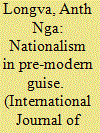|
|
|
Sort Order |
|
|
|
Items / Page
|
|
|
|
|
|
|
| Srl | Item |
| 1 |
ID:
072275


|
|
|
|
|
| Publication |
2006.
|
| Summary/Abstract |
The duality of nomad/sedentary or nomads/settlers-in Arabic badu/hadhar-is a classic feature of the social history of the Middle East. Related to this duality is the notion of tribe and its cultural ideology, tribalism. These are all concepts familiar to the students of the region, although increasingly, they are acquiring an antiquated character due to rapid urbanization and other forms of socioeconomic change. In the Arabian Peninsula, the dichotomy is still widely used. Whereas important research has been carried out over the years on the relationship between tribalism and nationalism in the Middle East, the persistence of this particular dichotomy in the Gulf has received little analytical attention. Many studies on the region speak of "bedouin" as groups, constituencies, or social or political actors, without clarifying what lies in the term and without asking by what criteria this category is defined or how it differs from other, non-bedouin categories. The association of bedouinism/tribalism with the Arabian Peninsula, "home of all the Arab tribes," is so deeply anchored in the imagination of both inhabitants and outsiders that to speak of Arabian bedouin in the late 1990s to early 2000s hardly raised any eyebrows. On closer observation, however, one has to acknowledge the growing lack of consonance between the original lexical meaning of the term bedouin (pastoral nomads) and its derivative meaning ("country" as opposed to "city," or "primitive" as opposed to "civilized") and the category to which it is purported to apply. Both meanings beg the question of why the hadhar-badu dichotomy has such a central place in Kuwaiti popular discourse-Kuwait being for all purposes a city-state with hardly any country and where "the rural areas" is a euphemism for the sprawling suburbs around the capital city. At the same time, official history tells us that Kuwait was founded by bedouin who had fled drought and famine from Central Arabia in the first half of the 18th century. Under these circumstances, what does it take to qualify as a badu or to disqualify as a hadhar in present-day Kuwaiti society? There is one more thing: far from slipping into oblivion as a result of urbanization, the hadhar-badu dichotomy has made a noticeable comeback in popular discourse over the past two decades. This article seeks to explain the present popular concern in Kuwait with a dichotomy whose analytical, if not historical, validity has often been questioned. It explores the reasons why important symbolic barriers are being raised between hadhar and badu that contribute to turning them into mutually exclusive identities. Throughout history, hadhar and badu have always been porous categories and the distinction was never clear, regardless of what the ongoing discourse may claim. Even today, ascription and self-ascription of badu and hadhar identities are contextual rather than absolute; they are also contested, more often than not. The first task at hand is to clarify the meaning of hadhar and badu in Kuwait and their use at the turn of the millennium. The article, thus, begins by pinpointing the social groups that these categories encompass and by giving a brief description of each group's stereotypes of the other. Through the description of Kuwaiti social practices in relation to marriage and the use of surnames, and the exploration of the pervasive role of the state, I hope to show that social reality in Kuwait is a lot more complex than the discourse of polarization suggests. Finally, it is argued that, to explain the revival of the dichotomy, we need to understand the ongoing hadhar criticism of the badu as an expression of anti-immigration feelings, of the kind one commonly hears in societies where the state has pledged to take in charge the cradle to grave welfare of its citizens. A parallel with anti-immigration discourse in Western European welfare-state nations is drawn up as an argument against an exclusively historical-cultural interpre
|
|
|
|
|
|
|
|
|
|
|
|
|
|
|
|
|
|
|
|
|